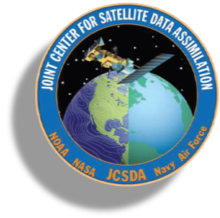Article by Dr. Dick Dee, JCSDA Observations Lead
A successful 4-week code sprint was conducted jointly by JCSDA core staff and NOAA contributors to greatly advance the capabilities of the observation component of the Joint Effort for Data Assimilation Integration (JEDI).
JEDI provides a shared and portable software framework with generic components that can be configured for a variety of operational-grade applications in Earth system analysis and prediction. JEDI is a joint project by JCSDA and its main stakeholders (NOAA, NASA, DoD, UKMO). The goal is to enable collaborative development, sharing of resources and faster transfer of research to operations. The JCSDA stakeholders are committed to using JEDI to develop their next-generation prediction systems.
An important milestone in the transition of any current operational data assimilation system to a JEDI-based system is to demonstrate that JEDI can handle the variety of observations as well as (or better than) the current system. The use of observations in JEDI is generally handled by the Unified Forward Operator (UFO) software component. The function of the UFO is to represent, as well as possible, the precise relationship between what is observed and what is modeled, so that the information provided by the observations can be used to improve the model forecasts. Implementation of UFO for a specific observing instrument requires detailed information about the instrument, the measurement technique, measurement uncertainties etc. It involves a simulation of each individual measurement, with possible bias adjustments, as well as robust quality control steps to prevent the use of observations that are not physical or cannot be adequately represented by the model.
Figure 1. A snapshot of the ZenHub board, an integrated project management tool within GitHub, used to manage the team work during the code sprint.
One of the key deliverables in the current JCSDA Annual Operating Plan is a set of UFO configurations that implement the use of observations in the Global Data Assimilation System (GDAS) operated by NOAA's National Center for Environmental Prediction (NCEP). To achieve this, it was necessary to produce specific UFO configurations for each of the observing instruments used in GDAS and to verify in detail that they produce equivalent results, in terms of the output of forward operators, bias adjustments and quality control steps. GDAS currently uses millions of observations daily, obtained in real time from more than 20 different satellite sensors and a large variety of surface stations, aircraft, radiosondes, etc. JCSDA core staff and NOAA collaborators have worked together throughout the year on this very complex task. The 4-week code sprint has been very successful in accelerating progress and consolidating results. The majority of work has been completed, with few remaining issues that will be handled in coming weeks.

